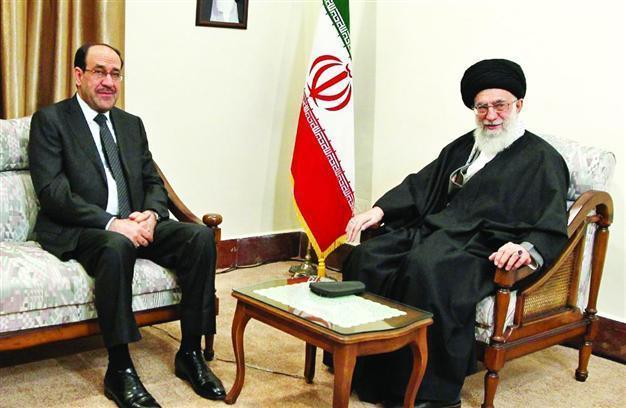Barzani to US: Don’t sell F-16 to Iraqi PM
ARBIL / BAGHDAD

Iraqi Prime Minister Nouri al-Maliki (L) meets with Iran’s supreme leader Ali Ayatollah Khamanei in Tehran. Khamanei says Tehran was pleased with the increasing authority of Iraq in the region. AFP photo
Masoud
Barzani, leader of the Kurdistan Regional Government (KRG) in northern Iraq, has said he opposes the sale of F-16 warplanes to Iraq while Nouri al-
Maliki is prime minister, as he fears they would be used against the region.
“The F-16 must not be put in the hands of this man,” Barzani told reporters at his residence near Arbil on April 22, referring to al-Maliki. “We must either prevent him from having these weapons, or if he has them, he should not remain in his position.” Barzani alleged that the prime minister had discussed using F-16s against the Kurdish region during a meeting with military officers. “During a military meeting, they talked about problems between Baghdad and Arbil,” Agence France-Presse quoted Barzani as saying. “They told him, ‘Sir, just give us the authority, and we would kick them out of Arbil.’ And [al-Maliki] answered, ‘Wait until the arrival of the F-16.’” The United States has agreed to sell 36 F-16 jets to Baghdad, increasing the capabilities of Iraq’s fledgling air force.
Barzani also said he thinks ExxonMobil, which has signed an oil exploration deal with the KRG against Baghdad’s wishes, could provide significant protection for the region. “If ExxonMobil came, it would be equal to 10 American military divisions,” he said. “They will defend the area if their interests are here.” Earlier this month, Barzani met with top U.S. officials including President Barack Obama, Vice President Joe Biden and Secretary of State Hillary Clinton in Washington.
On Oct. 18, Kurdish authorities signed a deal with ExxonMobil for the exploration of six areas in the Kurdish region, but Baghdad regards any contract not signed with the central government as invalid. The rift between Baghdad and the Kurds worsened this month when the KRG said it was halting oil exports because the central government was not paying oil firms operating in the north.
Al-Maliki’s Iran visitWhile ties have been further deteriorating between the central government and the KRG, al-Maliki visited Iran, underlining the close ties between the governments of the two countries. He met with Iranian President Mahmoud Ahmadinejad on April 22 and supreme leader Ayatollah Ali Khamanei yesterday. Khamanei said Tehran was pleased with the increasing authority of Iraq both in the region and in the entire Arab world. He said the full withdrawal of U.S. forces from Iraq was a great success achieved through the resistance of the Iraqi government and public will, according to state-run IRNA news agency.
Tension is also high between Ankara and Baghdad over the Turkish government’s stance toward Iraq.
Al-Maliki was angered when Ankara backed Iraqi Vice President Tariq al-Hashemi, whom he accuses of having formed death squads against Shiites, and who has taken refuge in northern Iraq. The Turkish government has also recently forged close ties with Barzani, who is embroiled in a row with the Baghdad government. Al-Maliki was further annoyed with Turkey for allowing al-Hashemi and Barzani to meet on its territory last week. When Barzani met with Turkish officials, both sides gave warm messages to the other. Barzani also called on the outlawed Kurdistan Workers’ Party (PKK) to lay down arms, a message echoed by Prime Minister Recep Tayyip Erdoğan.
Iraq summons Turkish envoy
The Iraqi government summoned Ankara’s ambassador in Baghdad yesterday to protest critical remarks by Erdoğan, the Foreign Ministry said. Ambassador Yunus Demirer heard the Iraqi complaint on April 22, after several days of charge and counter-charge.
Erdoğan accused his Iraqi counterpart on April 19 of stoking conflict between Shiite Muslims, Sunni Muslims and Kurds through “self-centered” behavior. Al-Maliki said Turkey was becoming a “hostile state” with a sectarian agenda, saying it was meddling in Iraqi affairs. Erdoğan returned to the fray on April 21, saying, “If we respond to Mr. Maliki, we give him the opportunity to show off.”
“[Foreign Ministry undersecretary] Labeed Abbawi acquainted the Turkish Ambassador with the Iraqi government’s intense protest against the recent statements,” the Iraqi Foreign Ministry said on its website, Reuters reported. “Undersecretary Abbawi expressed hope that the Turkish government will stop giving statements that affect Iraq’s sovereignty and internal affairs.”
Turkish officials confirmed that Demirer had been summoned, but said Ankara had not yet decided to summon the Iraqi ambassador. No note was given to the Turkish ambassador by Iraqi officials, officials added.
Barzani’s supportIn another sign of the KRG’s flourishing ties with Turkey, Barzani has reiterated his opposition to armed struggle as a means of solving Turkey’s Kurdish problem while discussing his recent visit to the United States, Europe and Turkey.
“Our stance is upfront and unequivocal with regard to Turkey’s domestic problems and the PKK. We support all peaceful efforts, but we are not going to side with an armed solution,” said Barzani, according to Doğan news agency. In addition to Turkey’s domestic affairs, Barzani also said he and his Turkish hosts discussed Syria during his visit, noting that the KRG could make no contribution to the unity of Kurds in Syria beyond a conference that it recently organized in Arbil, according to the website Peyamner, which is known to be close to the KRG.
Irag,
